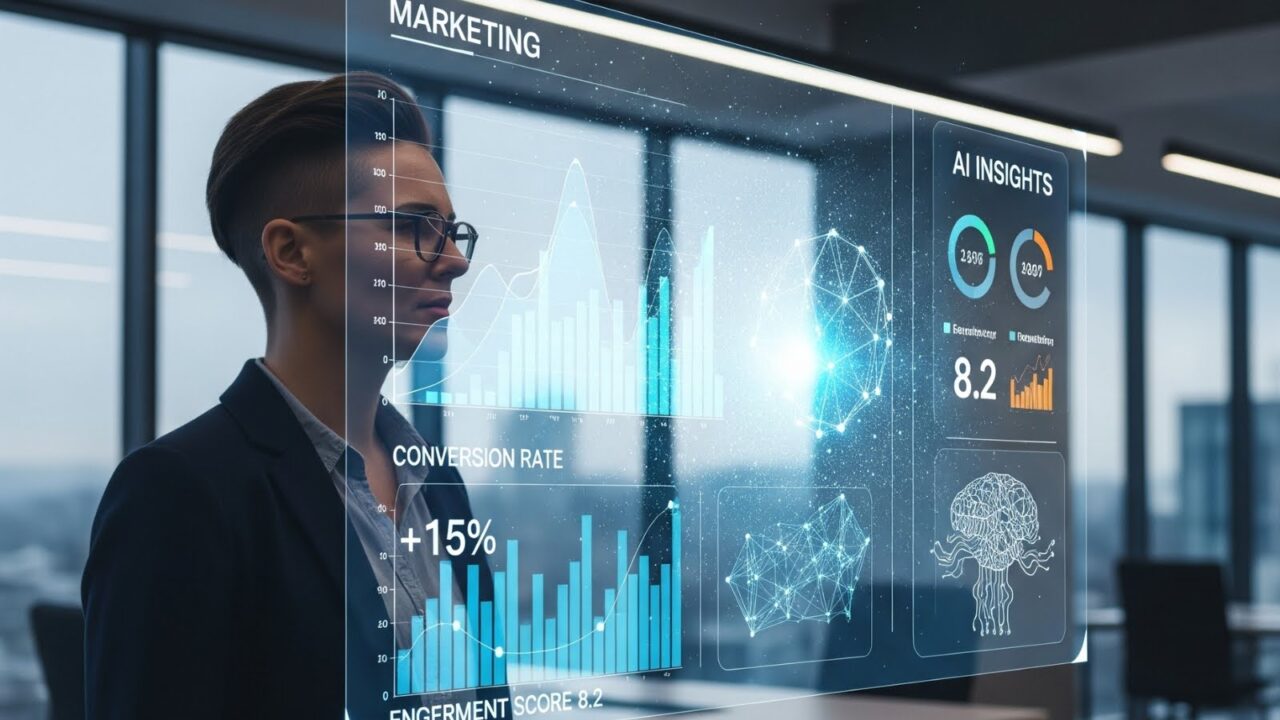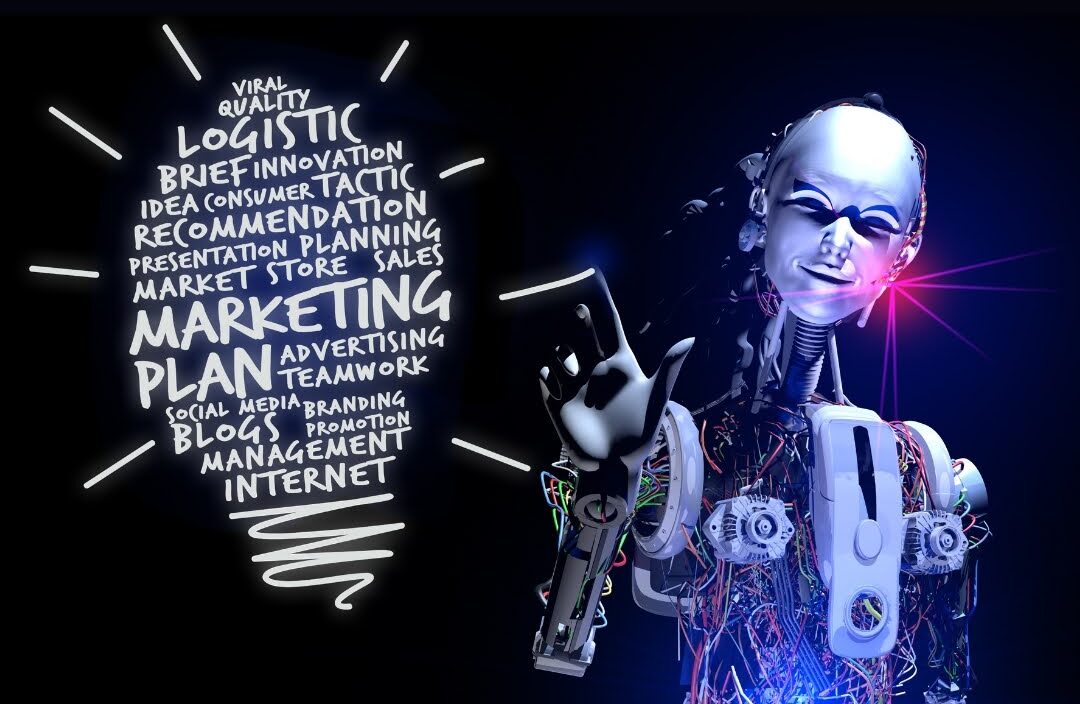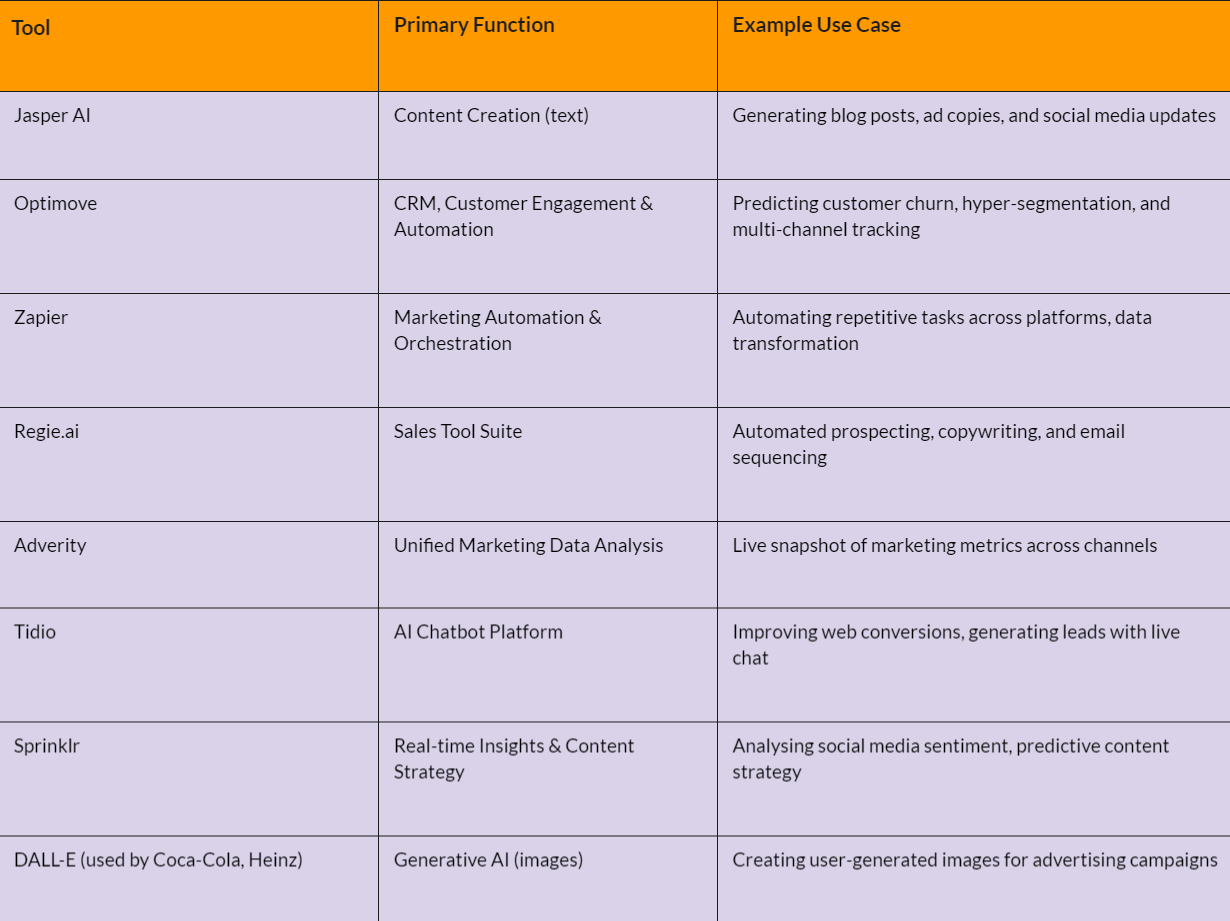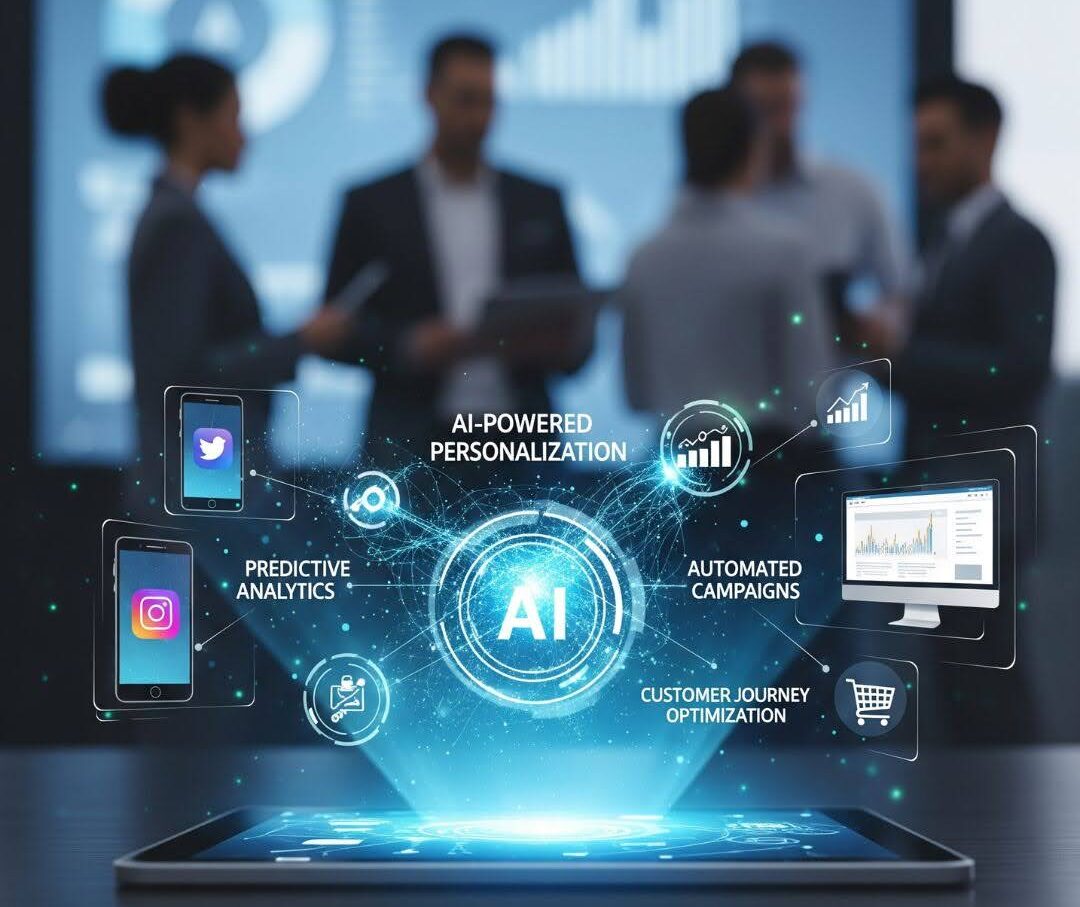
Artificial intelligence has evolved from a futuristic concept to an essential business tool, fundamentally transforming how companies approach marketing. By leveraging machine learning, natural language processing, and advanced algorithms, AI enables marketers to extract deep customer insights, optimize budgets, and deliver personalized experiences at scale. AI adoption across the global business landscape has reached 72% as of 2024, according to McKinsey, reflecting its critical role in modern marketing strategies. The following exploration examines how AI is reshaping the marketing landscape, its key benefits and essential tools, and the future of AI-driven marketing.
The Power of AI in Marketing Transformation
AI’s ability to process and analyse vast amounts of data at speed has ushered in a new era of marketing, moving beyond traditional methods to more data-driven, efficient, and personalised approaches.
Enhanced Decision-Making and ROI
AI marketing platforms analyse data far faster than humans, delivering near real-time insights for rapid tactical adjustments. This ensures campaigns stay effective and budgets are optimised.
For example, Starbucks uses its AI-powered “Deep Brew” platform to analyse customer purchase data in real time, enabling the company to adjust promotions, menu items, and marketing campaigns instantly.
Personalization and Customer Engagement
By examining behaviour patterns, purchase history, and real-time signals, AI enables highly tailored audience targeting and content delivery. From dynamic product recommendations to customised email and web experiences, this level of personalisation boosts relevance, engagement, and customer satisfaction.
A classic example is Netflix, which uses AI to create different promotional artwork for the same show based on a user’s viewing habits. A user who watches romance films might see a poster for a show focusing on the main characters’ love story, while a user who prefers action might see a poster with explosions and a thrilling scene.
Efficiency Through AI Marketing Automation
AI automates repetitive marketing tasks like email scheduling, social posting, and A/B testing, freeing teams to focus on creative and strategic work while scaling output.
For example, Sephora uses AI chatbots to automate customer interactions, answering a significant portion of queries instantly and freeing staff for higher-value tasks, thereby enhancing both customer satisfaction and operational efficiency
AI for Sales and Marketing: A Synergistic Approach
The integration of AI for sales and marketing creates a powerful synergy, enhancing both departments’ ability to understand customers and drive growth.

Predictive Analytics for Marketing and Sales
AI analyzes historical data to forecast sales and predict performance metrics like email open rates, ad engagement, and customer churn. Machine learning algorithms process vast datasets in seconds, generating insights about future customer behavior and spotting patterns humans might miss. For sales teams, this means identifying high-value leads and developing strategies to build customer loyalty through data-driven insights.
Audience Segmentation and Targeting
AI efficiently segments customers based on traits, interests, and behaviors, enabling highly targeted marketing messages. This granular approach ensures content reaches the most receptive audiences, significantly boosting conversion rates. For instance, a clothing retailer can use AI to identify athletic wear enthusiasts and create tailored campaigns specifically for this segment, improving relevance and engagement.
Customer Service and Support
AI-powered chatbots and virtual assistants transform customer interactions by providing instant responses, 24/7 availability, and personalized recommendations. These tools streamline queries, direct customers to appropriate departments, and handle routine issues, allowing human agents to focus on complex problems while improving overall customer experience and reducing churn rates.
The Role of Generative AI in Advertising and Content Marketing
Generative AI advertising and its application in content creation represent a significant leap forward, moving beyond simple automation to powering creative strategy.
Transforming Content Creation
Generative AI refers to advanced algorithms capable of producing original content—text, images, audio, or video—on demand. Unlike traditional tools, these models decode context, emulate natural language, and adapt to evolving requirements, offering unprecedented agility in communication. Brands can experiment with tone, iterate on headlines, and pivot campaigns instantaneously in response to market shifts.
AI-powered platforms create compelling blog posts, social media updates, ad scripts, and visuals tailored to specific brand voices. They excel at localization, enabling campaigns to be adapted for new regions quickly while maintaining nuance. This technology accelerates research, brainstorming, and content creation while significantly improving personalization and data analytics capabilities.
Generative AI Advertising Examples
Several leading brands have already demonstrated the power of generative AI in their advertising campaigns:
- Coca-Cola’s “Create Real Magic”: Using ChatGPT-4 and DALL-E, Coca-Cola created a tool allowing users to generate images from text input. This resulted in thousands of user-generated images, fostering immense engagement and driving platform traffic.
Coca-Cola – Create Real Magic
- Heinz’s DALL-E Collaboration: Heinz invited users to generate images of how they perceive a Heinz ketchup bottle, garnering over 800 million views globally and extensive media coverage.
Heinz – AI Ketchup Bottle
- BMW’s AI-Generated Car Designs: BMW integrated generative AI to transform luxury cars into digital masterpieces inspired by renowned artists, creating visually stunning designs that enhanced brand appeal and likely contributed to increased sales.
BMW – AI Car Designs
These examples highlight how generative AI is not just a tool for efficiency, but a catalyst for creative innovation in advertising.
Key AI Marketing Tools and Platforms
The market offers diverse AI marketing tools designed to support various functions:
- Data Analysis: Platforms like HubSpot, Salesforce Einstein, and Google Analytics 4 provide deep insights from vast data amounts, helping marketers understand campaign performance.
- Automation: Tools like Zapier, Optimove, and Albert.ai automate repetitive tasks and enhance digital advertising performance through advanced workflow optimization.
- Content Creation: Jasper, Writer, Claude, and MarketMuse assist with generating high-quality blog posts, ad copies, and social media content tailored to the brand voice.
- Social Media & Email: Sprout Social and ActiveCampaign offer AI-powered features for content generation, scheduling, and behavior profiling across digital channels.
- Sales Tools: Platforms like Salesforce, Salesloft, and Outreach.io assist with lead generation, sales engagement, and automated prospecting, significantly boosting sales team productivity.
Here is a selection of valuable AI marketing and sales tools:

The Future of Marketing with AI

The trajectory of AI suggests an even more integrated and transformative role in marketing, though it comes with its own set of challenges and ethical considerations.
Emerging Trends
Agentic AI represents autonomous systems that are moving from pilot projects to practical applications. These systems learn, adapt, and collaborate as virtual coworkers, signifying a shift towards more self-sufficient AI entities in marketing operations. Alongside this, human-machine collaboration is evolving through multimodal inputs and adaptive intelligence, shifting from human replacement to augmentation. Technology is becoming more responsive to human intent, blurring the line between operator and cocreator.
AI-powered search like Google’s Search Generative Experience (SGE) poses a particularly disruptive trend. Gartner anticipates a 50% drop in organic website traffic as customers increasingly opt for AI-generated search results. This means brands must adapt their content strategies to ensure high-quality, authoritative content that AI platforms will reference, competing intensely for limited visibility in this new search landscape.
Challenges and Ethical Considerations
Scaling AI solutions demands significant computational power and infrastructure, creating new challenges for global systems. Most importantly, ethical concerns around data privacy, algorithmic bias, and transparency require careful attention. As AI analyzes vast amounts of personal data, ensuring protection and preventing misuse becomes paramount. Algorithmic bias can lead to discriminatory marketing practices if not carefully managed, making the balance between technological advancement and ethical responsibility crucial for the industry’s future.
Skill Development
Organizations must prioritize upskilling marketing teams in data literacy and AI competence to navigate this evolving landscape. This includes understanding how AI systems work, interpreting their outputs, and effectively collaborating with AI tools to enhance strategic and creative outcomes. The emphasis on continuous learning reflects the rapid pace of change in marketing technology.
Conclusion
AI is transforming modern marketing through enhanced efficiency, personalization, and strategic decision-making. From automation streamlining operations to predictive analytics forecasting trends and generative AI revolutionizing content creation, AI proves indispensable for competitive businesses. However, success requires navigating emerging trends responsibly while addressing ethical considerations. Continuous adaptation and commitment to responsible AI implementation will be key to thriving in this AI-powered marketing era.
About the Author

Naveen Robi is a Marketing Intern at Founding Minds. He has completed his MBA with a major specialization in Marketing and a minor specialization in Data Science and Artificial Intelligence. With a strong interest in branding and digital marketing, he enjoys exploring innovative strategies to build brand value and enhance customer engagement. Outside of work, Naveen is a yoga athlete, finding focus and discipline through advanced yoga practice.
References
- McKinsey & Company. The Top Trends in Tech. Retrieved from https://www.mckinsey.com/capabilities/mckinsey-digital/our-insights/the-top-trends-in-tech
- Improvado. AI Marketing Trends. Retrieved from https://improvado.io/blog/ai-marketing-trends
- Cognizant. AI Marketing. Retrieved from https://www.cognizant.com/us/en/glossary/ai-marketing
- IBM. AI in Marketing. Retrieved from https://www.ibm.com/think/topics/ai-in-marketing
- International Journal of Scientific Research and Analysis. (2024). AI in Marketing. Retrieved from https://ijsra.net/sites/default/files/IJSRA-2024-2042.pdf
- Missouri State University. (2024, October 3). How AI is Transforming Marketing. Retrieved from https://news.missouristate.edu/2024/10/03/how-ai-is-transforming-marketing
- M1 Project. Benefits of Automating Marketing with AI. Retrieved from https://www.m1-project.com/blog/benefits-of-automating-marketing-with-ai
- Quora. What Are the Benefits of Integrating Artificial Intelligence into Digital Marketing Strategies? Retrieved from https://www.quora.com/What-are-the-benefits-of-integrating-artificial-intelligence-into-digital-marketing-strategies
- RDMC.ai. AI Case Studies in Marketing. Retrieved from https://rdmc.ai/blog/AI-Case-Studies-Marketing
- Microsoft. (2025, July 24). AI-Powered Success with 1,000 Stories of Customer Transformation and Innovation. Retrieved from https://www.microsoft.com/en-us/microsoft-cloud/blog/2025/07/24/ai-powered-success-with-1000-stories-of-customer-transformation-and-innovation
- Sprout Social. AI Marketing Tools. Retrieved from https://sproutsocial.com/insights/ai-marketing-tools
- The CMO. AI Marketing Tools. Retrieved from https://thecmo.com/tools/ai-marketing-tools
- HubSpot. AI Marketing. Retrieved from https://blog.hubspot.com/marketing/ai-marketing
- TalentDesk. AI Marketing Tools. Retrieved from https://www.talentdesk.io/blog/ai-marketing-tools
- Famewall. AI Marketing Tools. Retrieved from https://famewall.io/blog/ai-marketing-tools
- Zapier. AI Sales Assistant. Retrieved from https://zapier.com/blog/ai-sales-assistant

